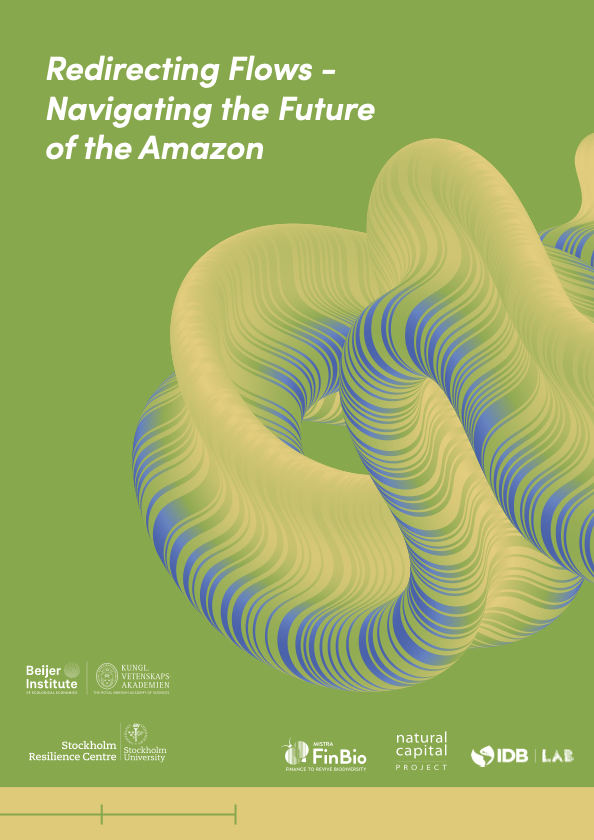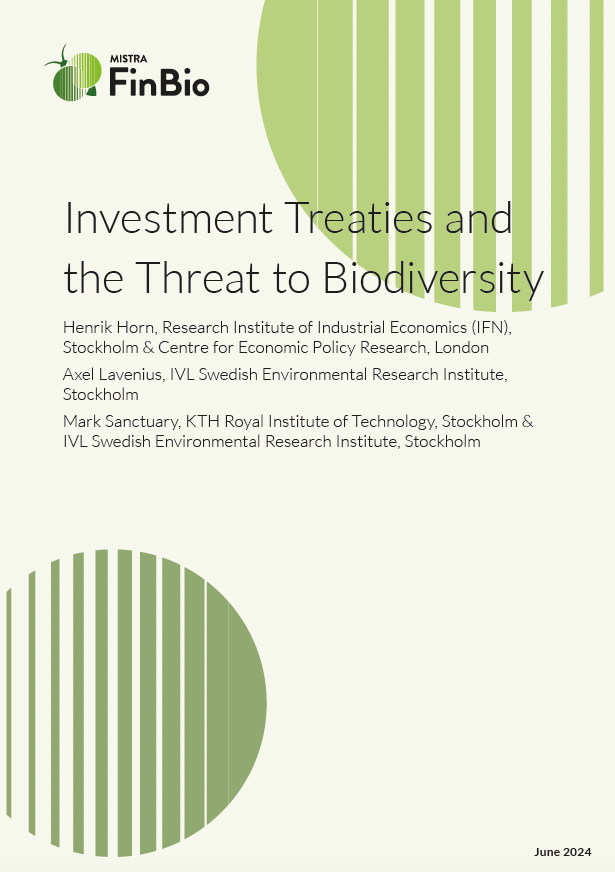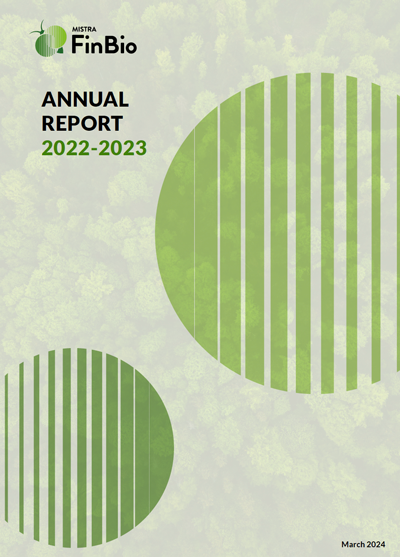FinBio’s mission is to provide cutting-edge research to connect the financial system and biodiversity with real-world impact. Here you will find resource that we publish and answers to key questions about our area of research.
Microlearnings
Reports

Redirecting Flows – Navigating the Future of the Amazon
The Amazon Basin, and the Latin America and Caribbean (LAC) region, stands at a critical juncture, grappling with pressing environmental challenges while holding immense potential
for transformative change through innovative solutions. This report illuminates the diverse landscape of social-ecological issues, technological advancements, community-led initiatives, and strategic actions that could help foster biosphere-based sustainability and resilience across the region.

Investment Treaties and the Threat to Biodiversity
Protecting biodiversity will require the phase-out of harmful production at a large scale. However, some of these stranded investments will be foreign-owned, and can therefore be protected by the more than 2 600 investment treaties that are in force worldwide. The compensation requirements that these treaties impose are often alleged to dissuade host countries from undertaking desirable policy measures that harm foreign investor interests. This paper seeks to identify the countries, and the bilateral investment treaties they are parties to, that pose the most severe threat to biodiversity protection.

”Reflecting on the first year of Mistra FinBio, I am pleased with the growth of our research team, the breadth of activities we are undertaking, and the rapidly expanding interest around finance and biodiversity.”
– Garry Peterson Program Director Mistra FinBio
Since the program started in November 2022 our researchers and partners have published several scientific publications, created reports and whitepapers and participated in numerus events around the globe.

Costing the Earth: measuring corporations’ impact on biodiversity loss
White paper by Pictet Asset Management with input from FinBio, introducing the Earth System Impact (ESI) model – a prototype biodiversity loss measurement tool developed by FinBio researchers.
Read more and download the white paper (select “Institutional investor”)
Videos
Watch our Seminar – Mitigating Pandemic Risks through Financial Influence
The seminar will delve into the ways in which financial entities, including investment companies, pension funds, and banks, could play a pivotal role in accelerating actions to mitigate the risks of new pandemics resulting from human activities and land use change. In a recently published paper, investors behind companies operating in regional hotspots for emerging and re-emerging infectious diseases have been identified. Large investors hold potential influence over companies operating in these hotspots, and could try to mitigate risks of new pandemics.
FAQ
Human activities, many of them commercial activities, today undermine the very base on which we ourselves depend – nature and a stable climate. These dependencies include pollination of crops by insects, regeneration of soils, pest controls in forestry or agriculture, storage of carbon and recycling of water, which leads to predictable rainfall. All of these are ecosystem services, underpinned by biodiversity, feeding into our economies, and the ability to make return on investments. When these functions are no longer provided, it will not only be costly, but sometime impossible for humans to thrive.
Beatrice Crona explains why investors should care about biodiversity in a webinar organised by Pictet:
Listen to the pocast version here:
The financial system is the backbone of our economic system. Through investments, loans, and ownership it steers what businesses thrive and what practices get scaled and end up dominating. Therefore it directly influences how much harm or good is done to nature and to biodiversity.
World leaders and governments have realized that we need to change the way we live on the planet. This is resulting in new regulations and policies that affect the financial system. Financial actors need to understand how they can be part of and help fund this change.
Greening finance is about taking stock of and reducing the environmental impacts of investments.
Financing green is about becoming nature-positive. This means developing ways of identifying business models that safeguard existing biodiversity, by integrating and enhancing biodiversity through their practice.
MISTRA FinBio will address the connectivity between biodiversity and finance in four distinct ways:
- We will explore and evaluate new technologies that track or map biodiversity and delivers open source data that we think could be transformative for the ability of biodiversity to actually be included in financial decision making.
- We will develop a set of examples of biodiversity markets and biodiversity funding mechanisms and trial these together with our stakeholders and our partners.
- We plan to develop a portfolio of scientifically grounded diagnostic tools that can be suitable for a range of different types of investors, such as asset managers, venture capital investors, or bond issuers.
- We hope to develop novel methods for stress testing national economic sectors in relation to biodiversity and also assess transition risks related to biodiversity and international trade agreements.
To address the gap between the financial system and sustainability science MISTRA FinBio has been developed as a transdisciplinary research programme. This means that researchers in the programme will work alongside and together with our industry partners to develop new science, and to translate the science into something that can be meaningfully used by investors in the short term.
MISTRA FinBio gathers a consortium of top scholars in a range of fields from economics to biodiversity science and even philosophy. To move rapidly from where we are now and find scientifically anchored investment practices, we will work together with carefully selected impact partners from industry, to drive change across a significant portion of the financial services industry.

